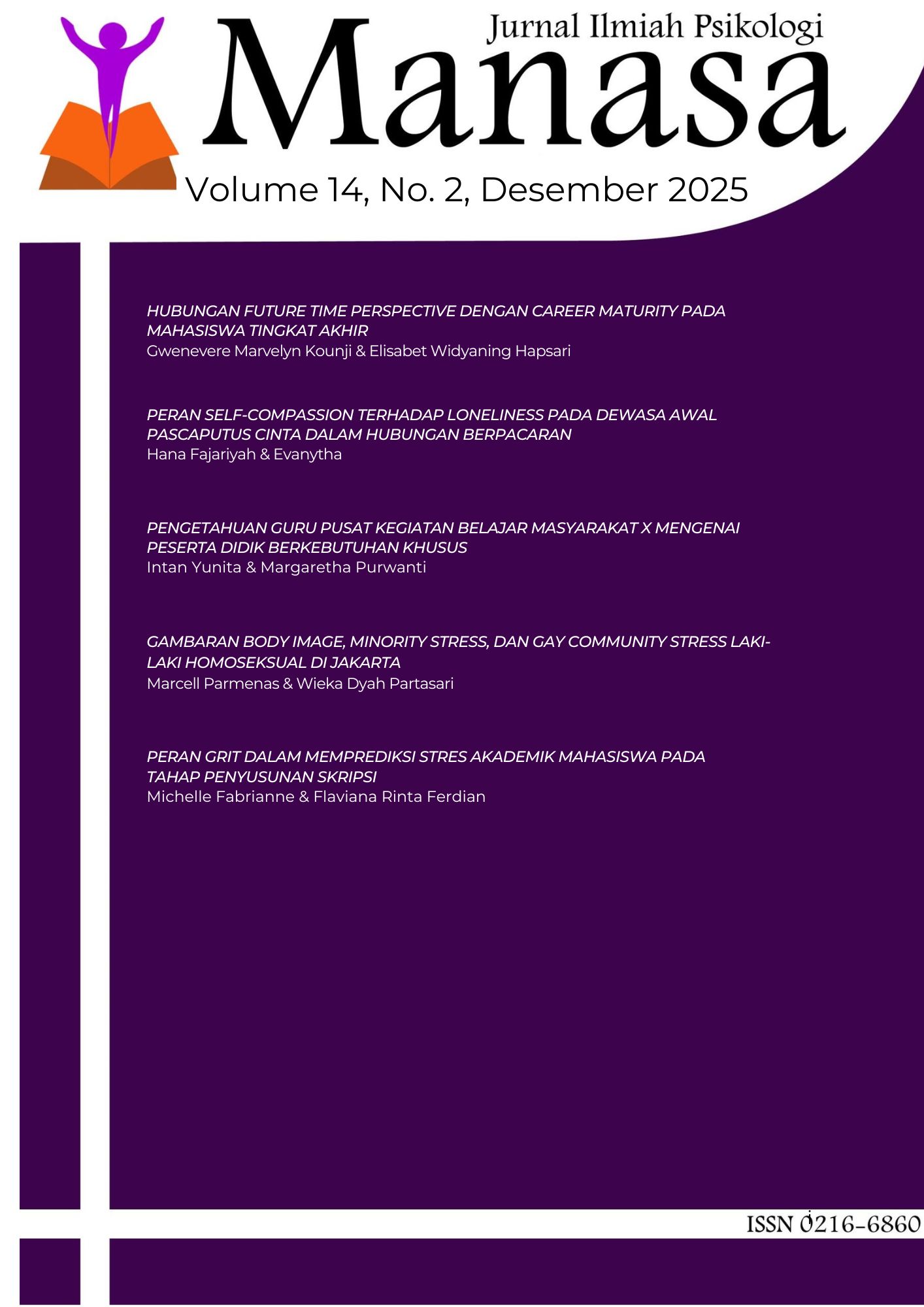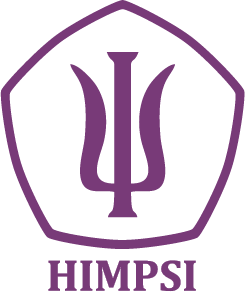HUBUNGAN FUTURE TIME PERSPECTIVE DENGAN CAREER MATURITY PADA MAHASISWA TINGKAT AKHIR
DOI:
https://doi.org/10.25170/manasa.v14i2.6624Keywords:
career maturity, future time perspective, final-year studentsAbstract
Final-year higher education students often face career challenges. Career maturity refers to an individual’s readiness to make informed career choices, encompassing all the processes, knowledge, and skills needed to complete career developmental tasks. It is essential for final-year students to achieve career maturity, considering they are nearing the end of their education and transitioning into the future world of work. The purpose of this study was to examine the relationship between future time perspective and career maturity. Future time perspective refers to the extent to which an individual perceives the future according to his or her needs and goals, thus influencing current thoughts, behavior, and decision making. This correlational study, conducted on 166 final-year students in Surabaya selected via incidental sampling. Using the Future Time Orientation Scale and a career maturity scale, Kendall’s Tau-B formula showed that future time perspective was positively related to career maturity. The higher the levels of future time perspective, the higher the levels of career maturity, and vice versa. This suggests final-year students who prioritize future goals are more likely to actively prepare for and achieve career maturity.
References
Azzahra, A., Savandha, S. D., Bharoto, R. M. H., & Kevin, N. H. (2024). The impact of high job qualification standards on unemployment rates among fresh graduates in indonesia. Journal Transnational Universal Studies, 2(4), 244–255. https://doi.org/10.58631/jtus.v2i4.109
Azzahrah, A., Noviekayati, I., & Rina, A. P. (2022). Peran internal locus of control pada kematangan karir mahasiswa. SUKMA : Jurnal Penelitian Psikologi, 3(2), 249–257. https://doi.org/10.30996/sukma.v3i2.7720
Badan Pusat Statistik. (2022). Jumlah mahasiswa (negeri dan swasta) di bawah kementerian pendidikan dan kebudayaan menurut kabupaten/kota, 2021 dan 2022. Badan Pusat Statistik.
Bozgeyikli, H., Eroğlu, S. E., & Hamurcu, H. (2009). Career decision-making self-efficacy, career maturity, and socioeconomic status with Turkish youth. Georgian Electronic Scientific Journal: Education Science and Psychology, 1(1), 15–24.
Buchari, I. F., Gismin, S. S., & Hayati, S. (2024). Pengaruh future time perspective terhadap kematangan karir mahasiswa akhir di kota makassar. Jurnal Psikologi Karakter, 4(1), 203–207. https://doi.org/10.56326/jpk.v4i1.3704
Cabras, C., & Mondo, M. (2017). Future orientation as a mediator between career adaptability and life satisfaction in university students. Journal of Career Development, 1–13. https://doi.org/10.1177/0894845317727616
Chen, Z., & Han, L. (2022). Achievement motivation and career maturity of high school students : The mediating role of career self-efficacy. ICMEIM, 5, 824–832. https://doi.org/10.2991/978-94-6463-044-2
Cheng, C., Yang, L., Chen, Y., Zou, H., Su, Y., & Fan, X. (2016). Attributions , future time perspective and career maturity in nursing undergraduates : correlational study design. BMC Medical Education, 1–8. https://doi.org/10.1186/s12909-016-0552-1
Coscioni, V., Oliveira, I. M., Teixeira, M. A. P., & Paixão, M. P. (2023). Future Time Orientation Scale: A new measure to assess the psychological future. Current Psychology, 43(12), 10703–10720. https://doi.org/10.1007/s12144-023-05193-w
Diaconu-Gherasim, L. R., Țepordei, A. M., Labăr, A. V., Vîrgă, D., & Măirean, C. (2024). University students’ future time perspective and career adaptability: The mediating role of grit. Career Development Quarterly, 72(2), 121–134. https://doi.org/10.1002/cdq.12348
Grashinta, A., Istiqomah, A. P., & Wiroko, E. P. (2018). Pengaruh future time perspective terhadap kematangan karir pada mahasiswa. Jurnal Psikologi Pendidikan & Konseling: Jurnal Kajian Psikologi Pendidikan Dan Bimbingan Konseling, 4(1), 25–31.
Hidayat, D. R., & Prabowo, A. S. (2019). A career development program for higher education in indonesia; the strategy to achieve career maturity. 1st International Conference on Advanced Multidisciplinary Research (ICAMR 2018), 227(1), 125–129.
Hossain, M. I., Yagamaran, K. S. A. P., Afrin, T., Limon, N., & Karim, A. M. (2018). Factors influencing unemployment among fresh graduates : a case study in klang valley, Malaysia. 8(9), 1494–1507. https://doi.org/10.6007/IJARBSS/v8-i9/4859
Husman, J., & Shell, D. F. (2008). Beliefs and perceptions about the future : A measurement of future time perspective. Learning and Individual Differences, 18, 166–175. https://doi.org/10.1016/j.lindif.2007.08.001
Huu, A. T., Nhat, T. T., Thanh, T. C. T., & Ho, G. L. (2022). The reason why the unemployment rate of college graduates is increasing: Case study in Ho Chi Minh City, Vietnam. International Journal of Multidisciplinary Research and Development, 9(1), 19–25.
Jatmika, D., & Linda, L. (2015). Gambaran kematangan karir pada mahasiswa tingkat akhir. Psibernetika, 8(2), 185–203.
Jia, Y., Hou, Z.-J., Zhang, H., & Xiao, Y. (2022). Future time perspective, career adaptability, anxiety, and career decision-making difficulty: exploring mediations and moderations. Journal of Career Development, 49(2), 282-296. https://doi.org/10.1177/0894845320941922
Jia, Y., Hou, Z. J., & Shen, J. (2022). Adolescents’ future time perspective and career construction: career adaptability as mediator and hope as moderator. Journal of Career Development, 49(1), 202–217. https://doi.org/10.1177/0894845320926579
Jung, H., Park, I., & Rie, J. (2015). Future time perspective and career decisions : The moderating effects of affect spin. Journal of Vocational Behavior, 89, 46–55. https://doi.org/10.1016/j.jvb.2015.04.010
Keane, C., Waldeck, D., Holliman, A., Goodman, S., & Choudhry, K. (2021). Exploring the experience of anxiety among final year students at university : a thematic analysis. The Qualitative Report, 26(8), 2621–2630. https://doi.org/https://doi.org/10.46743/2160-3715/2021.4874
Khairunnisa, N. F., & Indrawati, E. (2021). Hubungan future time perspective dan self efficacy dengan kematangan karir di italian fashion school. Jurnal Psikologi Kreatif Inovatif,1(1),47–55.
Kooij, D. T. A. M., Kanfer, R., Betts, M., & Rudolph, C. W. (2018). Future time perspective: a systematic review and meta-analysis. Journal of Applied Psychology, 103(8), 867–893. https://doi.org/10.1037/apl0000306
Kooij, D. T. A. M., Tims, M., & Akkermans, J. (2016). The influence of future time perspective on work engagement and job performance: the role of job crafting. European Journal of Work and Organizational Psychology, 26(1), 4–15. https://doi.org/10.1080/1359432X.2016.1209489
Kurniawati, H. (2021). The effect of future time perspective, emotional intelligence and peer support on career maturity in students. Jurnal Konseling Dan Pendidikan, 9(3), 304. https://doi.org/10.29210/166600
Lim, S. A., & You, S. (2017). Long-term effect of parents ’ support on adolescents ’ career maturity. Journal of Career Development, 1–14. https://doi.org/10.1177/0894845317731866
Ling, H., Teng, S., Liu, X., Wu, J., & Gu, X. (2022). Future work self salience and future time perspective as serial mediators between proactive personality and career adaptability. Frontiers in Psychology, 13(April). https://doi.org/10.3389/fpsyg.2022.824198
Park, I., Kim, M., Kwon, S., & Lee, H. (2018). The relationships of self-esteem, future time perspective, positive affect , social support , and career decision : A longitudinal multilevel study. Frontiers in Psychology, 9(April), 1–14. https://doi.org/10.3389/fpsyg.2018.00514
Roellyana, S., & Listiyandini, R. A. (2017). Peranan Optimisme terhadap Resiliensi pada Mahasiswa Tingkat Akhir yang Mengerjakan Skripsi. Prosiding Konferensi Nasional Peneliti Muda Psikologi Indonesia, April 2016.
Sari, B. S. I., & Affandi, G. R. (2023). The Role of Self Efficacy and Self-Concept in Students ’ Career Maturity [ Peranan Self Efficacy dan Konsep Diri terhadap Kematangan Karir Mahasiswa ]. 1–8.
Sartika, D., & Daulay, A. A. (2023). Final student career selection from : holland theory perspective. Ta Dib Jurnal Pendidikan Islam, 12(1), 201–208.
Savickas, M. L., Silling, S. M., & SCHWARTZ, S. (1984). Time perspective in vocational maturity and career decision making. Journal of Vocational Behavior, 269, 258–269.
Sharf, R. S. (2014). Applying Career Development Theory to Counseling, Sixth Edition. Brooks/Cole, Cengage Learning.
Super, D. E. (1974). Measuring Vocational Maturity for Counseling and Evaluation. the National Vocational Guidance Association, Division of the American Personnel and Guidance Association.
Super, D. E. (1980). A life-span, life-space approach to career development. Journal of Vocational Behavior, 16(3), 282–298. https://doi.org/10.1016/0001-8791(80)90056-1
Super, D. E. (1983). Assessment in career guidance : toward truly developmental counseling. Electronic Journal, 1957.
Walidaini, B. (2022). Perencanaan karir Mahasiswa semester akhir. TA’DIB : Jurnal Pemikiran Pendidikan, 12(2), 58–63.
Walker, T. L., & Tracey, T. J. G. (2012). The role of future time perspective in career decision-making. Journal of Vocational Behavior, 81(2), 150–158. https://doi.org/10.1016/j.jvb.2012.06.002
Wang, Y., Jiang, S., Wu, C., Cai, X., & Wang, F. (2022). Impact of the global megatrends, covid-19, and digital economy on professional career management transformation in asian countries. Sustainability (Switzerland), 14(17).
Downloads
Published
Issue
Section
License
Copyright (c) 2025 MANASA

This work is licensed under a Creative Commons Attribution-NonCommercial-ShareAlike 4.0 International License.









.png)
.png)

